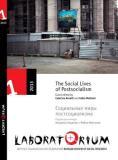Sensory Utopia in the Times of "Cultural Revolution": On Art, Public Space, and the Moral Onthology of Class
Sensory Utopia in the Times of "Cultural Revolution": On Art, Public Space, and the Moral Onthology of Class
Author(s): Anna KruglovaSubject(s): Anthropology
Published by: Центр независимых социологических исследований (ЦНСИ)
Keywords: Postsocialism; Ethics; Class; Pleasure; Embodiment; Urban Space; Cultural Policy
Summary/Abstract: Growing out of the history of social, psychological, and moral-philosophical delineations of class in former USSR, the tension between two aesthetic/ethical stances was brought to a particularly stark relief, and given a new interpretation, in a recent contestation of public space in a mid-size industrial Russian city. The article explores how the intellectualist and, especially, the dystopic mode of engagement with the world is juxtaposed with the "sensory utopia" sensibility that asserts not only the givenness but the goodness and the necessity of sensory and emotional embeddedness in one's physical and social reality, as well as the obligation to strive for and to defend the right to uncomplicated pleasures. Instead of condemning the latter as reactionist recourse to "simpler pasts" growing out of trumas of postsocialism, I suggest exploring it as a phenomenon in its own right, a cultural resource, and an optimistic ground for the deveopment of new urban, civic, and secular indentities and collectivities. In English, extended summary in Russian.
Journal: Laboratorium. Журнал социальных исследований
- Issue Year: 5/2013
- Issue No: 1
- Page Range: 25-51
- Page Count: 27
- Language: English

